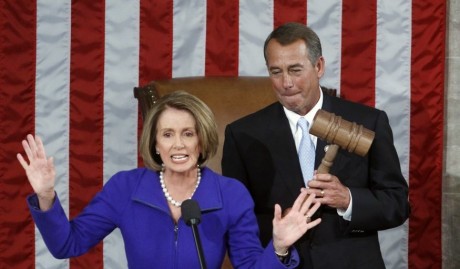Barack Obama's Clinton Makeover Cannot Hide Fatal Flaw
By Toby Harnden
Telegraph.co.uk

John Boehner
wields the speaker's gavel (Photo: Reuters)
The convening of a new Congress is traditionally an occasion when the White House allows the denizens of Capitol Hill their day if not in the sun, then at least on the cable news channels.
That was not the case on Wednesday when John Boehner, the new Speaker of the House, accepted an outsize gavel from Nancy Pelosi, the San Francisco liberal who became the first woman to occupy the post four years ago. Just over a mile away, at 1600 Pennsylvania Avenue, President Barack Obama was intent on making his own news. He wanted not only to rain on the Republican parade (there were 100 new Republican members of Congress and only a dozen Democrats) but also to signal that he’s still the main man in Washington.
Having briefed that there would be no overhaul of the White House staff, Mr Obama’s aides were busy doling out leaks that a major reshuffle was now underway. Out was Robert Gibbs, the President’s press secretary for nearly five years, and in as chief of staff was William Daley, an old Clinton administration hand and scion of the family that has controlled the Chicago Democratic machine for decades.
In accordance with the familiar charade, it was first leaked that current chief of staff Pete Rouse could keep his job if he wanted. Then the sighting of Mr Daley slipping into the White House signalled it was a done deal. Mr Gibbs said, rather unoriginally, that he was looking forward to spending more time with his family, while Mr Obama, rather unhelpfully, chipped in that his former mouthpiece could now earn a lot more money than his current “relatively modest pay”. In fact, Mr Gibbs earned $172,200 (pounds 111,220) in 2010 – a salary that most Americans can only dream of.
But now Mr Gibbs, previously a lowly press flack on campaigns and Capitol Hill, can expect to hit the big time on the speaking circuit and make some seriously large consultancy fees in the time-honoured fashion that makes Americans profoundly cynical about the ways of Washington.
So what does this mean for the Obama presidency? Having previously eschewed any comparisons with President Bill Clinton, he is now embracing the similarities he sees between 1995 and 2011. Back then, Mr Clinton recovered from a drubbing at the polls that had propelled Newt Gingrich into position as Speaker of the House and won comfortable re-election in 1996 over a 73-year-old Bob Dole who was reduced to shouting: “Where’s the outrage?”
While Mr Obama, whose vanity is something to behold even in a job where outsized self-esteem is a prerequisite, doubtless imagines himself as an Abraham Lincoln, Franklin Roosevelt and John F. Kennedy rolled into one, he is content for now to be seen as a Bill Clinton – at least in the tactical sense.
He is busily loading up his administration with Friends of Bill, some of them, such as Jacob Lew, the new budget director, and Gene Sperling, seemingly a cert for director of the National Economic Council, in the very same jobs they had under Arkansas’s Big Dog. All this housekeeping makes a lot of sense. Mr Obama needs to the centre if he is win re-election. Hiring old Washington hands may not represent change but at least they have worked with Republicans before and know how to cut a bipartisan deal. For all his much-vaunted communication skills, Mr Obama has done a poor job of explaining his policies and a less abrasive figure than Mr Gibbs will help him do that.
And Mr Daley could be just the kind of figure the President is looking for as he adjusts to the new realities of American politics. As a business-friendly centrist who criticised Mr Obama’s health care legislation as too Left-wing, Mr Daley should have the stature to overrule the starry-eyed idealists who view the President as a demigod.
The problem with the strategy, of course, is we are in 2011, not 1995. Although the Republican presidential field for 2012 is overcrowded and, thus far, uninspiring, the Grand Old Party is not about to make same mistakes Mr Gingrich did in the Clinton era.
While Mr Gingrich, who is also one of the 2012 aspirants to Mr Obama’s crown, declared he would transform America, Mr Boehner came in promising procedural changes and vowing to “move forward humble in our demeanour, steady in our principles, and dedicated to proving worthy of the trust and confidence” of the people.
Mr Boehner is determined to repeal Mr Obama’s health care bill, passed without a single Republican vote, and has cleverly positioned himself to adopt the small-government, anti-tax values of the Tea Party that created the wave that made him Speaker.
Democrats, however, still misunderstand the Tea Party. It was Mr Gibbs, remember, who mocked the outburst by Rick Santelli, the CNBC host, on the floor of the Chicago Mercantile Exchange in February 2009 that marked the start of the movement. “I’d be happy to buy him a cup of coffee – decaf,” Gibbs sneered, to guffaws from the White House press corps. Democrats continue to disdain it as a group of fringe wackos who don’t count. Steny Hoyer, Mrs Pelosi’s deputy, stated only this week that the “presumption is they have unhappy families”. Howard Dean, the 2004 presidential candidate, dismissed Tea Partiers as “almost all over 55 and white” and representing the “last gasp of a generation that has trouble with diversity”.
The continued failure of the Democrats to “get” the Tea Party could be their Achilles’ Heel in 2012, a flaw in understanding the electorate that no amount of staff reshuffles in the White House can overcome.
Toby Harnden is US Editor. This column was published on the Comment page of the Daily Telegraph newspaper.

